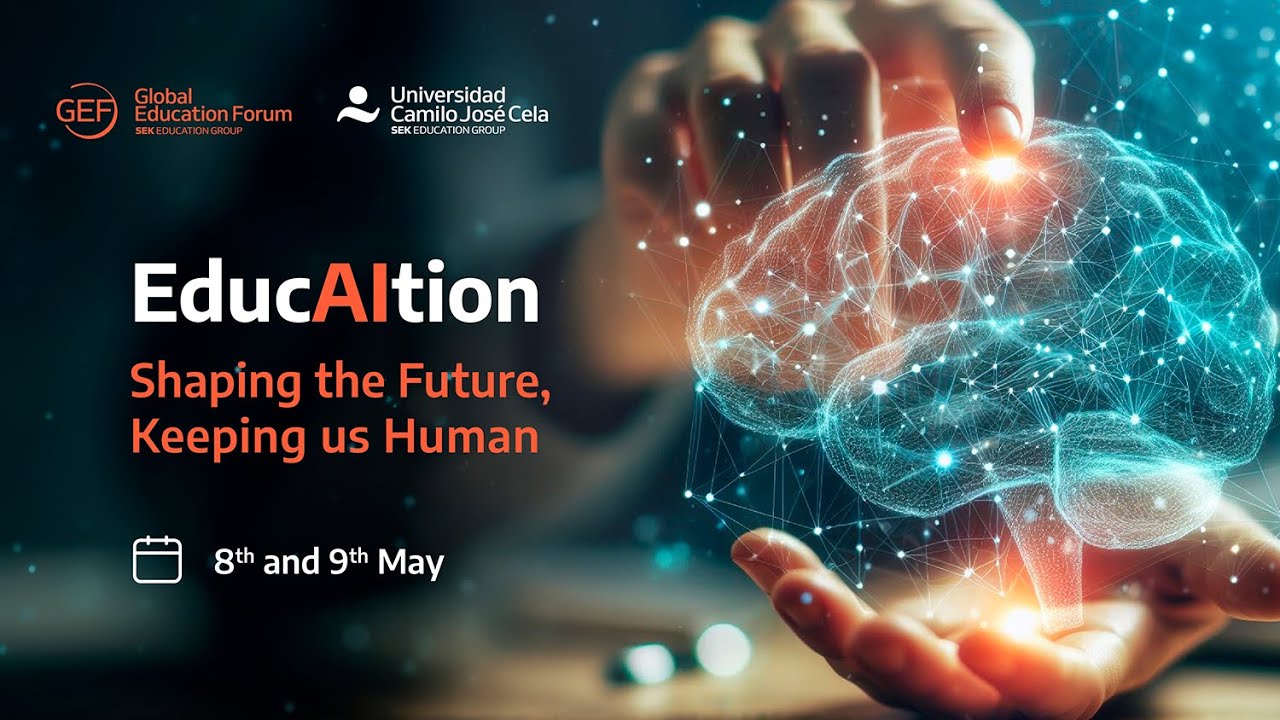The Future of Education | Yılmaz Köylü | TEDxEdUHK
Summary
TLDRThe speaker discusses the impact of artificial intelligence on education and the workforce, emphasizing the importance of developing AI-proof skills in students. They highlight the need for cognitive, metacognitive, social, and practical skills, and stress the value of being human by leveraging unique human abilities. The talk explores how learning languages and creating new ones can enhance analytical and creative thinking, and the speaker calls for educators to prepare students to harness their core human skills to face global challenges.
Takeaways
- 🌆 The speaker wakes up to a view of Hong Kong's bustling student life, reflecting on the impact of AI on education.
- 🤖 Recent technological advancements in AI, such as GPT-4 and Dolly, are revolutionizing education with their capabilities in text, image, audio, and video generation.
- 📚 AI models like GPT-4 can generate content, but they lack creativity and common sense, as illustrated by the MTR line example in Hong Kong.
- 🎨 AI can mimic artistic styles, as demonstrated by the image generator creating art in the styles of Van Gogh and Salvador Dali.
- 📝 UNESCO and Sal Khan have outlined the educational uses of GPT-4, including personal tutoring and teaching assistance.
- 💡 The speaker emphasizes the need for educators to ensure students are 'AI-proof' by developing resilience and human skills that AI cannot replicate.
- 🌟 The OECD and the World Economic Forum both highlight the importance of cognitive, metacognitive, social, and practical skills in education.
- 🚀 The top five skills sought by employers, and necessary for being AI-proof, are analytical thinking, creative thinking, resilience, flexibility, and motivation.
- 🌍 Learning languages can enhance analytical and creative thinking, and contribute to understanding diverse cultural perspectives.
- 🌐 The loss of linguistic diversity is a global issue, with UNESCO estimating a 90% reduction in the world's languages over the next 75 years.
- 📖 The speaker's experience in teaching linguistics through project-based learning demonstrates the potential for creativity and analytical thinking in language creation.
Q & A
What is the speaker's concern about the impact of artificial intelligence on students?
-The speaker is concerned about how recent technological developments, especially in AI, will affect the daily lives and education of students.
What are some AI tools mentioned in the transcript that are being used in education?
-The AI tools mentioned include GPT-4, Palm 2, Microsoft co-pilots, Dolly, Adobe Firefly, and mid-journey.
What limitations does the speaker highlight about AI models like GPT-4?
-The speaker points out that AI models cannot be creative or use common sense, and they can only regurgitate information already available on the internet.
How does the speaker demonstrate the capabilities of AI in image generation?
-The speaker created drawings of an Asian woman in the styles of Van Gogh and Salvador Dali using an image generator AI, showcasing the AI's ability to mimic artistic styles.
What does the speaker mean by being 'AI proof'?
-Being 'AI proof' means being resilient and immune to being replaced by AI in the future, which requires capitalizing on human skills that cannot be easily replicated by AI.
Which skills does the OECD emphasize as crucial in education?
-The OECD emphasizes cognitive, metacognitive, social, and practical skills as crucial in education.
What are the five skills that the World Economic Forum suggests employers seek most?
-The five skills are analytical thinking, creative thinking, resilience, flexibility, and agility, motivation and self-awareness, curiosity, and lifelong learning.
How does the speaker propose to improve analytical and creative thinking skills?
-The speaker suggests learning new languages and creating a language from scratch as ways to improve analytical and creative thinking skills.
What was the outcome of the linguistics class project at Case Western Reserve University?
-Students created their own alien languages, which improved their analytical thinking skills and sparked their creativity, as evidenced by their questionnaire responses.
Why is linguistic diversity important, and what is at risk if it is lost?
-Linguistic diversity is important because languages are a window into human cognition, history, and culture. Losing a language means losing the associated cognition, culture, and traditions.
How does the speaker conclude their talk?
-The speaker concludes by urging the audience to consider what makes them truly human and how they can harness those skills to be AI proof and address global challenges.
Outlines

Cette section est réservée aux utilisateurs payants. Améliorez votre compte pour accéder à cette section.
Améliorer maintenantMindmap

Cette section est réservée aux utilisateurs payants. Améliorez votre compte pour accéder à cette section.
Améliorer maintenantKeywords

Cette section est réservée aux utilisateurs payants. Améliorez votre compte pour accéder à cette section.
Améliorer maintenantHighlights

Cette section est réservée aux utilisateurs payants. Améliorez votre compte pour accéder à cette section.
Améliorer maintenantTranscripts

Cette section est réservée aux utilisateurs payants. Améliorez votre compte pour accéder à cette section.
Améliorer maintenantVoir Plus de Vidéos Connexes

GEF Madrid 2024: Academic-Corporate Collaboration in AI

S2E3 Non lavoreremo più!

Unlocking Potential: Navigating Learning in the Era of AI | Haryanto Salim | TEDxYouth@SWA

Will AI replace jobs Explained in Telugu? JOBS That AI Will Replace | Telugu Badi

Summit Hector Escamilla Shaping the Future, Keeping us Human GEF 2024

Machine Learning, AI, and the Future of Education | Marc Natanagara | TEDxBrookdaleCommunityCollege
5.0 / 5 (0 votes)
